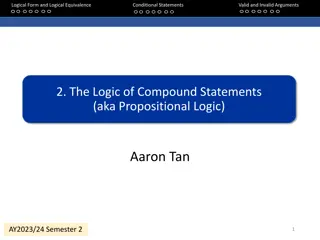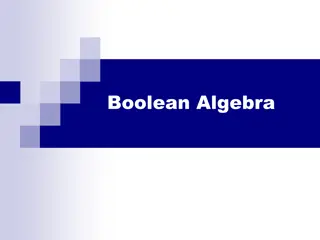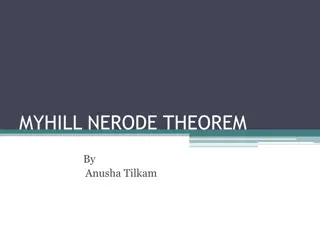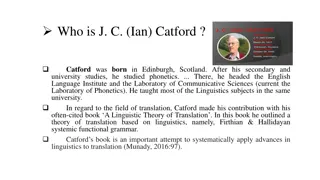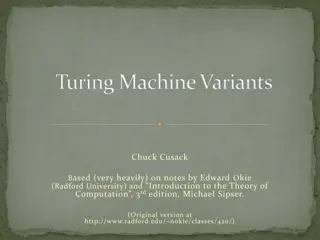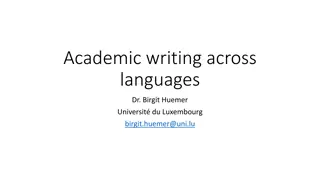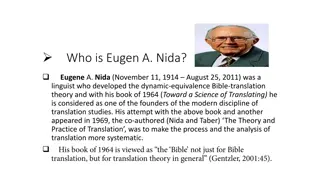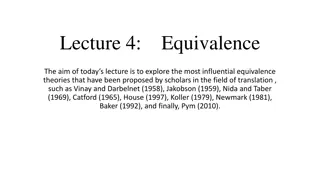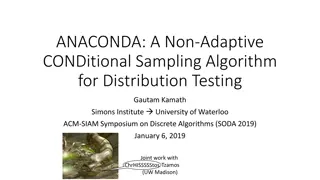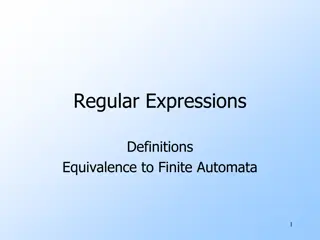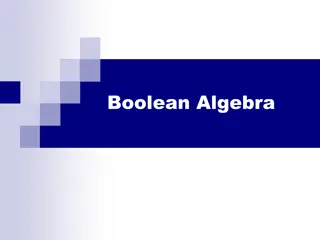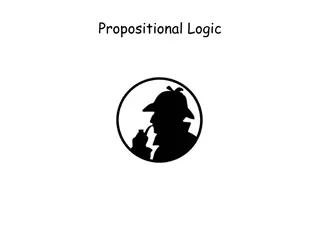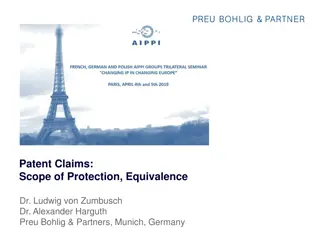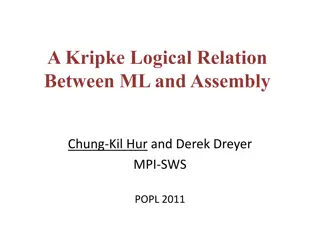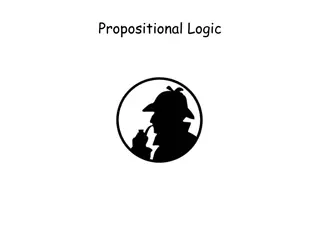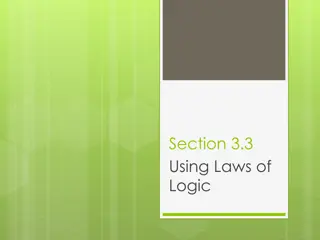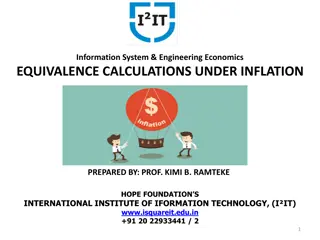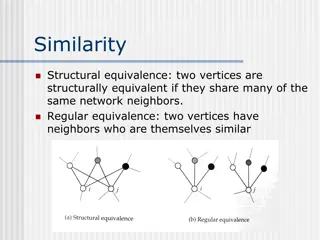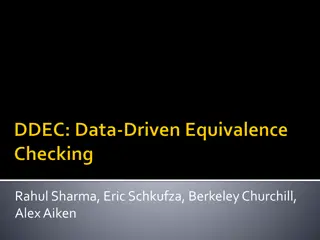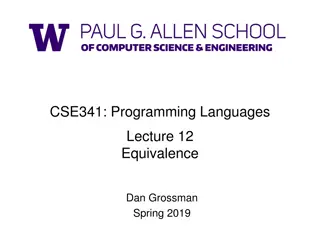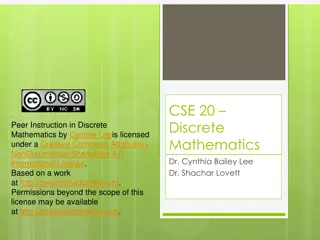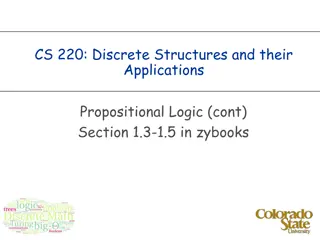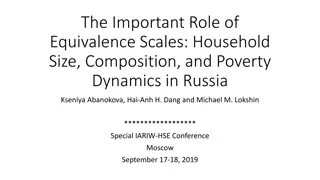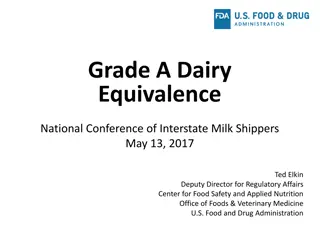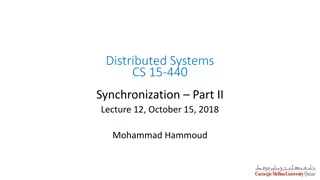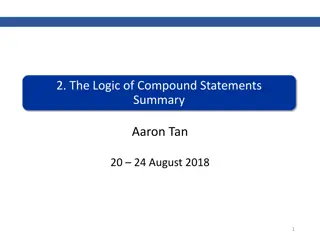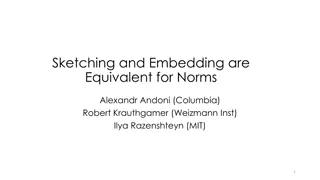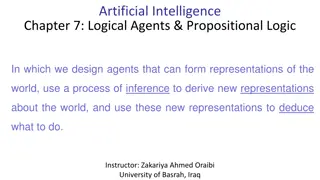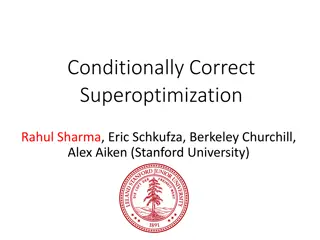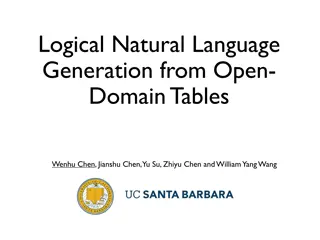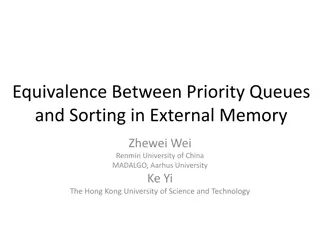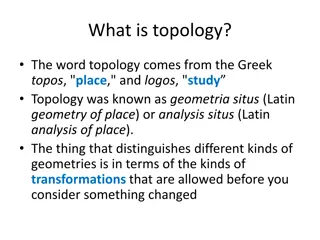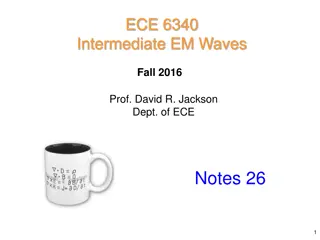Logical Form and Equivalence in Conditional Statements
Delve into the intricacies of logical form, equivalence, and compound statements in the realm of propositional logic. Explore valid and invalid arguments, conditional statements, and the logic of compound statements with puzzles to sharpen your logical reasoning skills. Unravel scenarios like determ
4 views • 81 slides
Logical Expressions and Symbolism in Sentential Logic
Understanding sentential logic, logical expressions, and symbols through examples of logical reasoning and inference. Explore the concepts of logical OR, AND, negation, and the complexities of inclusive and exclusive logic in various scenarios.
1 views • 33 slides
Boolean Algebra and Logical Statements
Introduction to Boolean algebra, logical statements, and compound statements. Explore the concepts of Boolean variables, logical operators, writing conventions, equivalence in Boolean algebra, and truth tables. Learn how to analyze and evaluate logical expressions using truth tables.
1 views • 25 slides
Myhill-Nerode Theorem in Automata Theory
Myhill-Nerode theorem states that three statements are equivalent regarding the properties of a regular language: 1) L is the union of some equivalence classes of a right-invariant equivalence relation of finite index, 2) Equivalence relation RL is defined in a specific way, and 3) RL has finite ind
1 views • 20 slides
J.C. Catford's Linguistic Theory of Equivalence in Translation
J.C. Catford, a prominent figure in translation studies, developed a theory of equivalence in translation based on functional linguistics. His work emphasizes the process of substituting text from one language to another, focusing on formal and textual equivalence. Catford's theory sheds light on ho
2 views • 12 slides
Turing Machine Variants and Equivalence Theorems Summary
Explore different variants of Turing machines, such as stay-put TMs and multi-tape TMs, along with key results like the equivalence theorems. Understand the idea behind simulating multi-tape TMs with single-tape TMs and how different models are related. Dive into the proofs and implications of these
0 views • 14 slides
Equivalence Class Testing and Its Application in Software Testing
Equivalence class testing is a software testing technique that involves dividing input values into classes for effective testing coverage. Equivalence classes are defined mathematically as subsets of a given set, ensuring partitioning and mutual exclusivity. By applying equivalence partitioning, tes
3 views • 21 slides
Academic Writing Across Languages: Challenges and Solutions
Explore the historical development of languages in academia and science, equivalence issues, written academic genres, evolution from Latin to national academic languages, and the importance of a common language in academia. Dive into the specialized text structures, syntax, idiomatic phrases, and pr
0 views • 29 slides
Eugene A. Nida - Pioneer of Dynamic Equivalence Bible Translation Theory
Eugene A. Nida (1914-2011) was a linguist who revolutionized Bible translation theory with his concept of dynamic equivalence. Through works like "Toward a Science of Translating," he shaped modern translation studies. Nida's theory distinguishes between formal and dynamic equivalence, favoring the
0 views • 10 slides
Equivalence Relations and Partition Induced Relations
The concept of equivalence relations and partition-induced relations on sets are explored. Equivalence relations satisfy reflexivity, symmetry, and transitivity, making them important in various mathematical contexts. The relation induced by a partition of a set is shown to be an equivalence relatio
2 views • 24 slides
Equivalence Theories in Translation Studies
Exploring influential equivalence theories by scholars such as Vinay and Darbelnet, Jakobson, Nida and Taber, Catford, House, Koller, Newmark, Baker, and Pym. Equivalence plays a central role in translation studies, but the concept remains debatable and controversial. The nature of equivalence raise
4 views • 10 slides
Distribution Testing Algorithms for Property and Equivalence Testing
Distributional Property Testing involves determining if a sample satisfies a given property or is from a specific distribution. The ANACONDA algorithm and other methods are used to test for uniformity, identity, and equivalence of distributions in various domains. Results show complexities and chall
2 views • 24 slides
Equivalence of Regular Expressions and Finite Automata
Regular expressions are an algebraic method to describe languages, specifically the regular languages. They are defined recursively based on symbols and operations such as concatenation and closure. Precedence rules and examples are also provided. The equivalence between regular expressions and fini
1 views • 25 slides
Boolean Algebra and Logical Statements
Boolean Algebra allows for formalizing logical reasoning using variables that can be either true or false. It involves logical statements, compound expressions, logical operators like AND, OR, NOT, writing conventions, equivalence, and truth tables to determine the truth values of statements. By und
0 views • 25 slides
Propositional Logic and Logical Operators
Learn about propositional logic, statements, logic operators, compound statements, exclusive-or, logical equivalence, and writing logical formulas for truth tables. Explore how to create compound statements for exclusive-or using different approaches and ensure logical equivalence. Enhance your know
1 views • 26 slides
The Acceleration of the Universe and the Equivalence Principle Violation in the Horndeski Vector-Tensor Theory
Exploring the implications of the Equivalence Principle Violation after reheating in the context of the accelerated expansion of the universe. The study delves into the Horndeski vector-tensor theory, gravitational waves, and the impact of modified gravity and dark energy. Insights are provided on t
2 views • 20 slides
Translation Strategies and Equivalence Models in Modern Translation Studies
In modern translation studies, the concept of equivalence and different translation strategies are explored. Scholars have debated the subjectivity involved in translation, with some advocating for a descriptive approach while others stick to prescriptive discussions of equivalence. Influenced by pa
2 views • 10 slides
Patent Claims and Equivalence Principle in European Patent Law
European patent law, specifically Art. 69 EPC and the equivalence principle, play a crucial role in determining the scope of protection conferred by a patent. The importance of patent claims, interpretation guidelines, and the concept of equivalence are highlighted, emphasizing the balance between p
1 views • 16 slides
Logical Relations in Programming Languages
Explore the concept of logical relations in programming languages, focusing on the relation between high-level and low-level programs. Learn about contextual equivalence, its benefits and limitations, and how logical relations offer a robust framework for defining program equivalence. Discover why l
1 views • 18 slides
Propositional Logic Concepts
Explore different facets of propositional logic, including conditional statements, logic operators, logical equivalence, contrapositives, and proofs. Delve into the intricacies of if-then statements, logical negations, and the nuances of if, only-if conditions. Enhance your understanding of proposit
0 views • 25 slides
Laws of Logic and Logical Reasoning
Laws of logic play a crucial role in reasoning and making deductions. This comprehensive guide explains the use of contrapositives, examples of conditional statements, and the significance of laws like the Law of Syllogism. Understanding these principles helps in effectively analyzing statements and
0 views • 8 slides
Equivalence Calculations Under Inflation
Equivalence calculations under inflation involve assessing the impact of changing prices on the purchasing power of money over time. Key concepts include CPI, inflation, and comparing costs across different periods. This content discusses how inflation affects consumer behavior and provides insights
0 views • 12 slides
Structural Equivalence and Similarity Measures in Network Analysis
This content discusses the concepts of structural equivalence and regular equivalence in network analysis. Structural equivalence is based on shared network neighbors, while regular equivalence considers the similarities of neighboring vertices. Various measures, such as cosine similarity and Pearso
0 views • 12 slides
Ensuring Equivalence in Compiler Optimization Programs
Explore the challenges of proving equivalence in compiler optimization programs, validate refactorings, and analyze the trustworthiness of compilers through binary equivalence testing. Learn about handling loops, utilizing decision procedures, and running tests to confirm program behavior.
0 views • 24 slides
Equivalence in Programming Languages: CSE341 Lecture Summary
In CSE341's Programming Languages lecture, Equivalence is explored as the fundamental software engineering concept of determining if two pieces of code are equivalent. The focus is on code maintenance, backward compatibility, optimization, and abstraction. Equivalence is defined by having the same o
1 views • 14 slides
Peer Instruction in Discrete Mathematics
Explore the world of discrete mathematics with Dr. Cynthia Bailey Lee and Dr. Shachar Lovett through peer instruction. Dive into topics like step-by-step equivalence proofs and the equivalence of logical operators. Discover the different methods to show propositions are equivalent and delve into log
0 views • 14 slides
Propositional Logic Fundamentals
Exploring the key concepts in propositional logic including conditional statements, converse, contrapositive, inverse, biconditionals, logical equivalence, operator precedence, and truth tables. Learn about the importance of truth values and logical equivalences in compound propositions.
0 views • 22 slides
The Important Role of Equivalence Scales in Poverty Dynamics
Equivalence scales play a crucial role in measuring household welfare and poverty dynamics in Russia. This study explores the impact of adjusting scales on poverty lines, chronic poverty, and income mobility using subjective well-being data. The findings reveal higher elasticity for adding adults to
0 views • 26 slides
Equivalence in Dairy Regulations
Equivalence in dairy regulations is a crucial concept ensuring that different food safety systems offer the same level of public health protection. This involves assessing foreign food safety systems for compliance with US standards, particularly in Grade A dairy products regulated under the Pasteur
0 views • 16 slides
Distributed System Synchronization and Logical Clocks
Continuing from the previous lecture on time synchronization, this session delved into logical clock synchronization, mutual exclusion, and election algorithms in distributed systems. Logical clocks, such as Lamport's Clock and Vector Clock, play a crucial role in defining the order of events withou
0 views • 33 slides
Compound Statements in Logic
The summary discusses the logic of compound statements, covering logical form, equivalence, tautologies, contradictions, conditional statements, valid and invalid arguments, and more. It explains the definitions of statements, negation, conjunction, disjunction, statement form, logical equivalence,
0 views • 12 slides
Sketching and Embedding Equivalence for Norms in Metric Spaces
Sketching and embedding techniques are explored by Alexandr Andoni, Robert Krauthgamer, and Ilya Razenshteyn in the context of metric spaces. This research delves into the equivalence between sketching and embedding for various norms, addressing topics such as compressing high-dimensional objects, s
0 views • 15 slides
Logical Agents and Propositional Logic in AI
Designing logical agents involves forming representations of the world, using inference for deriving new insights, and deducing actions based on these representations. Knowledge Base (KB) is a crucial component, comprising known facts and current percepts to infer hidden states. Propositional logic,
0 views • 23 slides
Superoptimization: Accelerating Code Performance through Conditional Correctness
Explore the concept of superoptimization, a technique to generate optimal code implementations for performance-critical systems. The process involves enumerating all possible programs, transforming them with loops, and proving equivalence with the original code. While optimizations are formally veri
0 views • 22 slides
Analyzing Precipitation Titrations and Spectroscopy in Chemistry Lecture
Exploring the concepts of precipitation titrations and spectroscopy in a chemistry lecture covering topics such as titration curves, sharpness at equivalence points, and titration of mixtures. The lecture delves into examples like the titration of Hg2^2+ by CrO4^2-, emphasizing the three regimes bef
0 views • 17 slides
Advancements in Logical Natural Language Generation from Open-Domain Tables
Cutting-edge research in logical natural language generation (NLG) is transforming the field by moving beyond traditional surface realization to generate summarized text, conclude trends, and apply logical and mathematical operations. By addressing limitations such as lack of logical inference, summ
0 views • 33 slides
Equivalence Relations and Partitions
Equivalence relations are essential in mathematics for understanding relationships between various elements within a set. This content explores reflexive, symmetric, and transitive relations, along with examples demonstrating the concept's application. Discover the significance of partitions in defi
0 views • 5 slides
Equivalence Between Priority Queues and Sorting in External Memory
This study explores the relationship between priority queues and sorting in the context of external memory, shedding light on their equivalence. The work delves into the intricate connections and implications of these fundamental data structures, offering insights into their practical applications a
0 views • 32 slides
Introduction to Topology: Understanding Geometric Transformations
Topology, derived from the Greek words for "place" and "study," explores geometric transformations through the concept of topological equivalence, distinguishing shapes based on deformations that do not involve tearing or scattering. Discover the fundamental principles of topology, such as topologic
0 views • 19 slides
Equivalence Principle in Intermediate EM Waves
Basic idea behind the equivalence principle in the context of intermediate electromagnetic waves is explored. The principle enables the replacement of actual sources with equivalent sources at the boundary of a closed surface, maintaining certain field conditions and boundary constraints. The concep
0 views • 40 slides
